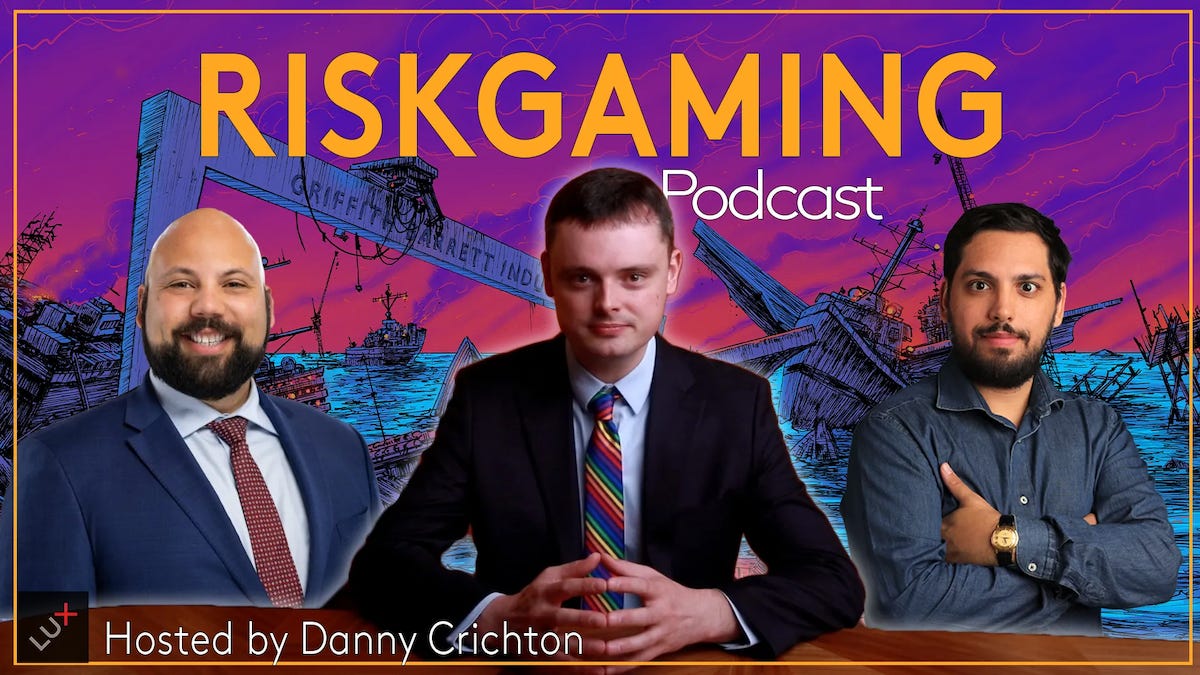What America can learn from the rebooting of Estonia
Joel Burke on consensus, AI, and pathways to change
Estonia is a nation of 1.3 million people, situated in a dangerous neighborhood on the Baltic Sea. It gained its independence early in the 20th century, only for the Soviets to take the country by force. Estonia gained its independence again in 1991, and has since become one of the most digital-native countries in the world. How did a nation with a feared secret police become so open to the government digitizing data on every one of its citizens? And why did other former Soviet Republics not follow in the same way?
Those questions and more are at the center of Joel Burke’s book, Rebooting a Nation: The Incredible Rise of Estonia, E-Government and the Startup Revolution. The nation has outperformed across the board, and Joel takes a full look at the unique institutions and cultures that led to such success.
Joel, Laurence, and I talk about the early years of Estonia’s existence, why eGovernment can actually be even more private than our existing data systems in the United States, and finally, why Estonia’s government has so deeply embraced the private sector.
This conversation has been edited for length and clarity. For the full conversation, please check out our podcast.
Danny Crichton:
Joel, not only are you the author of a book called Rebooting a Nation, you were also the rebooter of sorts of a nation. So let’s dive in. We’re talking about Estonia, a country of a million people on the Baltic Sea. It generally comes into the news in the context of U.S.-Russia-Ukraine relations as this beacon of hope. It is a democracy in a very tough neighborhood. So give us a little context. Why Estonia? Why were you there?
Joel Burke:
It’s a great question, but a little bit long to answer. So I’ll try to give the Cliff Notes version. I was early at a YC / Andreessen–backed startup, and I had always wanted to live and work in Europe. I ended up moving to Berlin to run a company for Rocket Internet, which is a venture builder/private equity.
Once there, I quickly decided German entrepreneurship was very different from Silicon Valley entrepreneurship, and I wanted to do something more impactful and mission driven. I came across a job ad for a startup within a government, and I never heard of such a thing. The job was working in Estonia for the e-Residency project, which is a flagship digital initiative.
They ended up hiring me, I assume, because I was the only person foolish enough to move to Estonia in mid-February when it’s dark for something like 22 hours a day. But I had a front-row seat to the country’s change ... Well, I shouldn’t say it changed. By the time I got there, it was already changed. Their digital government was already set up and going, but I got there at the time when the rest of the world was learning about it. And I was just astounded by what I saw and thought that there were things that we could learn.
Fast forward a couple of years, I returned to the United States and did this program called TechCongress, which takes tech people and puts them in Congress. And I was frankly shocked by the lack of tech policy knowledge and the lack of digital state capacity. So I decided to write this book about Estonia with the hopes I could take some of Estonia’s tangible lessons and share them in the United States.
Danny Crichton:
So Estonia was an independent nation, kind of survives the Bolshevik Revolution, does not survive Stalin, gets annexed, regains its independence in 1991. The title of your new book is Rebooting a Nation, but the nation was already rebooted in ‘91. So this is a 3.0 situation. Why the sudden change? Were the fresh, new institutions just not cutting it?
Lux’s Josh Wolfe often says that chips on shoulders put chips in pockets. That clearly worked for Estonia.
Joel Burke:
It was a perfect storm.
For one, after five decades of Soviet occupation, you can imagine people were ready for something radically different. So you had folks like Prime Minister Mart Laar, who was one of the earliest PMs. He was very much in the Thatcherite vein and was ready to embrace the opposite of anything the communists had done or how they thought about economic policy.
He basically put the country through economic shock therapy. I mean, removing subsidies, helping foreign investors take over ailing state-owned businesses, agricultural reform to remove collectivization.
And then it happens that independence, in 1991, is coming at the dawn of the modern web. So former President Toomas Hendrik Ilves, is Estonian American, educated at Columbia University and grew up in New Jersey. In his education, he had to learn programming. Very early in the country’s independence, he encountered Mosaic, the browser, and just identified it as a place where Estonia could be competitive. There was this new technology, a new frontier with a more level playing field.
And then the last thing I’d mention is the mentality. As you can imagine, there’s the Lara-esque approach, there’s rejection of communist ideals, but looking at Estonia on a map, it’s quite close to Finland. And Finland was always held up as this benchmark for the country. Estonia considered itself more culturally Nordic than Baltic.
Throughout occupation, because Tallinn was relatively close to Helsinki, they could catch radio waves and rebroadcast American TV shows. So Estonia had these repeated glimpses of what life was like in the West. Once they finally gained re-independence, there’s this feeling of, “Wow, there’s such a huge gap here that we needed to jump over and we’re not going to be able to do it by following the traditional development playbook.” So they were willing to do pretty bold and big things. They had a massive chip on their shoulder, and they were willing to take risks to try to get there.
Danny Crichton:
Josh Wolfe often says that chips on shoulders put chips in pockets. That clearly worked for Estonia.
One thing you show in your book is that this wasn’t just one decision. There wasn’t just one moment where they say, “Oh, we’re going to modernize,” and it happens with this particular law. You have everything from the Tiger Leap Initiative and then you are trying to get ID card rollouts more than a decade later. And then you have to deal with the Russian cyberattacks. I mean, this is a long journey. I’m wondering if you could talk about how, at each one of those moments, the country was able to keep going and double down.
Joel Burke:
This is a really important point. There was sustained political will across different administrations and varying political parties. They decided this is the direction that we’re going to go, and they did. I do think this is critical.
First, there’s the Tiger Leap campaign, which, for context, is basically the idea of connecting all the schools in the country to the web, and then there was an additional educational campaign that went along with it. So one, you give kids access to the web so they can learn digital skills.
And then two, you also provide supplemental digital skills while at the same time, you’re training the teachers. All this helps filter out digital skills across the rest of society. That was critically important for basically building a workforce that was ready for the future.
There was sustained political will across different administrations and varying political parties. They decided this is the direction that we’re going to go, and they did. I do think this is critical.
Just a couple weeks ago, Estonia signed a deal with OpenAI to roll out OpenAI services across its schools again. So they’re doing this repeatedly for new technology. So there has been basically a long consensus to continue to invest in digital in recent years. But I think that was built up through elite-driven pushes to get this done. I mean, in retrospect, the Tiger Leap campaign sounds obvious. Of course, we should connect school to the web and teach kids digital literacy, but at the time, you’re in the late ‘90s and you might be taking that money away from paying teachers’ pensions. I mean, the country was economically pretty desperate until semi-recently.
Certainly, there was fighting. I do think part of the reason Estonia has seemed so stable and so willing to push forward is because many of the fights happen in local media in the Estonian language, which many outsiders don’t really see or pay attention to. That’s one of the perks of being a small country. I mean, every single thing that the United States does is litigated and talked about across the world.
And so I think there were many more debates than were on the surface, but indeed it has been quite something to see, first, elite consensus and then general population consensus to invest in digitalization.
Danny Crichton:
From Estonia’s own history under Soviet occupation, there’s a lot of concern around privacy, individual protections. You had secret police, you had secret intelligence, informants all across the world. Why did it go in such a different direction where people are willing to say, “Look, I trust my government to have a digital ID. I can use it for the bus.” Clearly, this data could be used against me, so to speak.
Joel Burke:
It’s a fascinating question.
When I was working for the e-Residency program in Estonia, I was the guy they’d roll out to talk to American and German delegations. And indeed, that was almost always one question like, “Well, Estonia’s interesting, but we have different cultural values and think differently about privacy.”
Maybe we have security through obscurity, but I actually think any motivated actor within the U.S. government could get that data if they wanted to, and I would have no idea whether they did or what information they had access to.
But I guess I would reframe the question and push back a little bit. So let’s take me as an example. The government has my information at the IRS, it probably has some healthcare information because I worked in Congress, I’m sure it has some security information and background checks information on me. I don’t actually know what all the government has. It’s probably spread out on paper files across a bunch of different agencies. I don’t know when someone goes and accesses it. So, yeah, maybe we have security through obscurity, but I actually think any motivated actor within the U.S. government could get that data if they wanted to, and I would have no idea whether they did or what information they had access to. Not to mention the fact that they can just go on private markets and go to a data broker and probably buy it anyway.
In Estonia, they built up basically a legal system that puts the citizen or the resident in the driver’s seat. So when I go to my dashboard on the e-Estonia site and look at all the digital services, I can see in a unified view the information that the government has, so I know what information they have. I can also see who has viewed my data and why.
How they got there, I think, was in part because of the push for independence. I think there was initially so much trust in the independence leaders who helped shepherd the country out of Soviet occupation and into re-independence that there was a willingness from the people to trust them. But they also built in these safeguards legislatively and on the tech side.
Even in the United States, I think that’s something that we can learn from. I don’t think we can and should adopt Estonia solutions wholesale. I think it much more likely, if we ever do something like digital identity, we’ll partner with Apple and Google because they’ve already got biometric scans of my face. I trust Apple to verify my identity far more than I do the DMV, right?
And so I think we’ll do it a different way, but this mentality of doing these hard things, having sustained investment, and building in these safeguards is really important.
They have this program, Accelerate Estonia. The tagline is, like, make illegal things legal. And the government actively works to support the private sector and create innovations.
Laurence Pevsner:
So when you went to Estonia you knew in advance that it would be a technologically advanced country. What still surprised you anyway when you arrived? And how did the country continue to change while you were there?
Joel Burke:
One thing was just how far the government went to try and make itself accessible and change proactively. So they have this program, Accelerate Estonia. The tagline is, like, make illegal things legal. And the government actively works to support the private sector and create innovations.
Even the e-Residency program I work for was initially pitched at an ideathon — a hackathon style thing. And then what happened is that everyone got enthusiastic about it. The parliament basically voted to create the legal changes that would allow the program to exist, and then the program was able to get going in the matter of a couple of months. I’m sitting at Stanford in California, I can’t imagine Governor Newsom saying, “Yeah, we’re going to make illegal things legal. We’re going to proactively work with the private sector to make it easier for you to build houses, let alone defense or something.” This wholesale mindset shift of trying to work proactively with the private sector is really important.
Laurence Pevsner:
You write in your introduction about how America is facing what you call our Macy’s moment. I was wondering if you could say a little bit about that.
Joel Burke:
I think we’re at the dawn of another technological revolution and a change in the way the world operates. When I think about the United States and how our government was architected, it was architected for a pre-digital age. Maybe we’ve digitized some things — you fax things or you email forms instead of mailing them. But by and large, the way our systems actually operate are still made for the industrial era before digital.
So the Macy’s moment: It was at the start of eCommerce, and there was this question about whether big box stores still had a role. Macy’s is still around, but it’s not the heyday of the Macy’s parade and being the iconic American brand.
What I want people to take away from Estonia is the mindset, the culture that we need to build together. If we keep having this situation where, every four years, someone comes and kicks down what the last guy built, we’re never really going to build the systems and the kind of society and efficient government that we want.
And so we need to come together at a consensus point for society and think of how we want to face the next generation. And I think it’s going to be AI. We need to have a conscious strategy about how we’re going to adopt that. And I am very excited. I think AI and digitalization more broadly open up huge avenues.
Danny Crichton:
On this front, let me ask you: We recently had an episode with Kelvin Yu, who is a fellow at the Foundation for American Innovation and published a bunch of proposals to improve industrial policy — less governance and digital IDs and all the stuff that we’re talking about. But one of the key points he made was a focus on details, a focus on small things. Instead of trying to do a big rebooting of a nation, the idea is to make tiny patches to the code base all over the place. If you do hundreds of those over a period of time, you aggregate to something that is much larger.
Joel Burke:
Kelvin’s great. I have the playbook open in a different tab, and I haven’t actually dug into it yet, so I’m not going to get over my skis here. But I think both are true in a way. This is a bit of a cop out.
When I was working in Congress, there was a talk of secret Congress, which sounds much more nefarious and cool than it is, but it’s basically this idea of doing the things that aren’t sexy, that don’t appear on primetime television. And that is where things are most tractable, because if you can get a small bill done and it doesn’t have to get litigated on CNN and Fox and MSNBC and become highly politicized, it’s much easier. There is something true here.
However, I guess where I feel we’re at as a society is we need to find consensus again. Maybe I’m romanticizing the days of the Cold War, but I think about our foreign policy, for instance, and it feels like we were very aligned over several decades.
The wholesale challenge from technology is going to be so important. It is going to affect society on such a massive scale. No doubt we need to fix the potholes in the road, too, and we need to make these thousand small changes, but we also just need to get our stuff together as a society and figure out what the pathway is for America.






